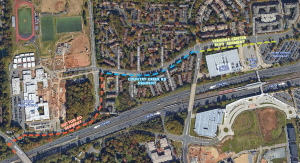- MWCOG and TPB are directing more federal funding to non-highway transportation projects in Northern Virginia.
- Vienna Metro and Shrevewood Elementary projects major recipients in county.
 The Metropolitan Washington Council of Governments (MWCOG) announced recently that two Fairfax County non-highway transportation projects have received funding. The National Capital Region Transportation Planning Board (TPB) approved approximately $7.2 million dollars in federal funding for eight local, non-highway transportation projects in Northern Virginia.
The Metropolitan Washington Council of Governments (MWCOG) announced recently that two Fairfax County non-highway transportation projects have received funding. The National Capital Region Transportation Planning Board (TPB) approved approximately $7.2 million dollars in federal funding for eight local, non-highway transportation projects in Northern Virginia.
Funds are being provided for the Vienna Metro Bike and Pedestrian Improvements and Shrevewood Elementary School Safe Routes to School (SRTS) projects in the county.
$800,000 has been allocated to the Vienna project to construct a shared-use path, two-way cycle track, and sidewalk from Blake Lane to the Vienna Metro I-66 westbound ramp, dramatically increasing connectivity with the nearby Oakton High School.
 Another $800,000 goes to the Shrevewood Elementary project to add three new crosswalks with sidewalk or shared use path connections serving the school and nearby W&OD Trail.
Another $800,000 goes to the Shrevewood Elementary project to add three new crosswalks with sidewalk or shared use path connections serving the school and nearby W&OD Trail.
The projects will be funded by the Transportation Alternatives Set-Aside (TA Set-Aside) Program, which funds small-scale projects such as pedestrian and bicycle facilities, trails, SRTS projects, and other community improvements.
Funding for other localities within Fairfax County includes $316,579 to improve pedestrian safety in the Clifton Historic District by adding new sidewalks, crosswalks, signage, landscaping, and lighting to a stretch of Main Street.
In addition, the City of Fairfax has been allocated $914,745 to add a mixture of on-road bicycle lanes and so-called “super sharrows”—formally “priority shared-lane markings” and basically a sharrow with some additional paint—to University Drive, helping create a multimodal spine through Old Town Fairfax.
All of the projects are intended to provide or improve access to the National Capital Trail Network, a planned 1,400-mile system of trails that, building on existing off-street trails, will connect the entire region when completed. The network will provide healthy, low-stress access to open space and reliable transportation for people of all ages and abilities as well as an environmentally friendly alternative to motorized travel.
FABB helps local riders be heard as multimodal and equity-oriented projects are developed throughout Fairfax County. Want to learn more or become a part of our advocacy efforts? Contact FABB at [email protected].
